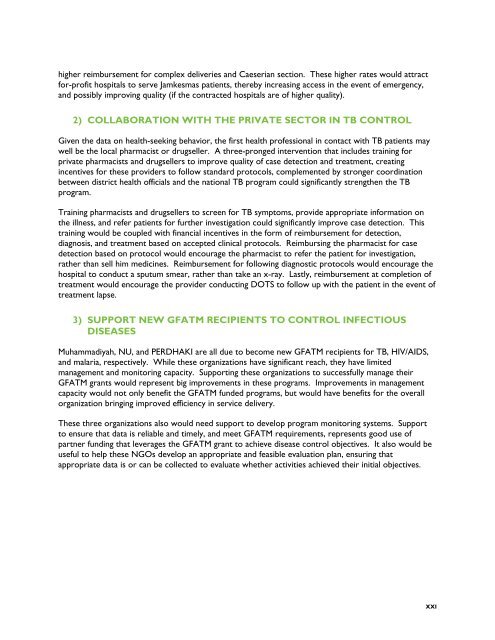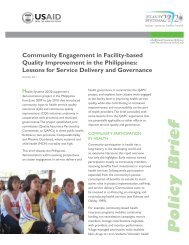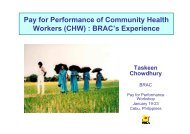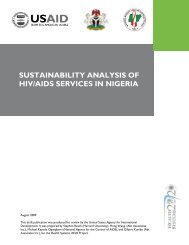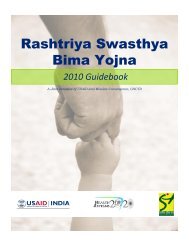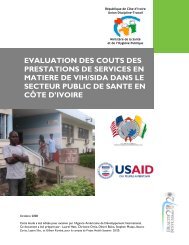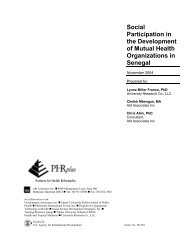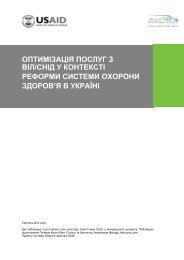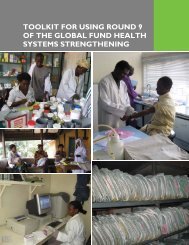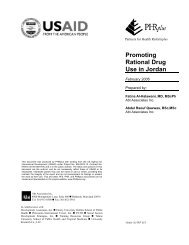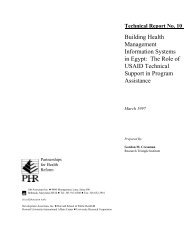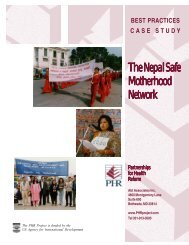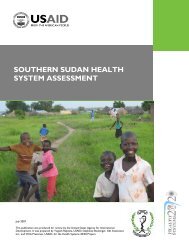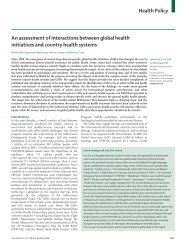PRIVATE SECTOR HEALTH CARE IN INDONESIA - Health Systems ...
PRIVATE SECTOR HEALTH CARE IN INDONESIA - Health Systems ...
PRIVATE SECTOR HEALTH CARE IN INDONESIA - Health Systems ...
- No tags were found...
Create successful ePaper yourself
Turn your PDF publications into a flip-book with our unique Google optimized e-Paper software.
higher reimbursement for complex deliveries and Caeserian section. These higher rates would attractfor-profit hospitals to serve Jamkesmas patients, thereby increasing access in the event of emergency,and possibly improving quality (if the contracted hospitals are of higher quality).2) COLLABORATION WITH THE <strong>PRIVATE</strong> <strong>SECTOR</strong> <strong>IN</strong> TB CONTROLGiven the data on health-seeking behavior, the first health professional in contact with TB patients maywell be the local pharmacist or drugseller. A three-pronged intervention that includes training forprivate pharmacists and drugsellers to improve quality of case detection and treatment, creatingincentives for these providers to follow standard protocols, complemented by stronger coordinationbetween district health officials and the national TB program could significantly strengthen the TBprogram.Training pharmacists and drugsellers to screen for TB symptoms, provide appropriate information onthe illness, and refer patients for further investigation could significantly improve case detection. Thistraining would be coupled with financial incentives in the form of reimbursement for detection,diagnosis, and treatment based on accepted clinical protocols. Reimbursing the pharmacist for casedetection based on protocol would encourage the pharmacist to refer the patient for investigation,rather than sell him medicines. Reimbursement for following diagnostic protocols would encourage thehospital to conduct a sputum smear, rather than take an x-ray. Lastly, reimbursement at completion oftreatment would encourage the provider conducting DOTS to follow up with the patient in the event oftreatment lapse.3) SUPPORT NEW GFATM RECIPIENTS TO CONTROL <strong>IN</strong>FECTIOUSDISEASESMuhammadiyah, NU, and PERDHAKI are all due to become new GFATM recipients for TB, HIV/AIDS,and malaria, respectively. While these organizations have significant reach, they have limitedmanagement and monitoring capacity. Supporting these organizations to successfully manage theirGFATM grants would represent big improvements in these programs. Improvements in managementcapacity would not only benefit the GFATM funded programs, but would have benefits for the overallorganization bringing improved efficiency in service delivery.These three organizations also would need support to develop program monitoring systems. Supportto ensure that data is reliable and timely, and meet GFATM requirements, represents good use ofpartner funding that leverages the GFATM grant to achieve disease control objectives. It also would beuseful to help these NGOs develop an appropriate and feasible evaluation plan, ensuring thatappropriate data is or can be collected to evaluate whether activities achieved their initial objectives.XXI


